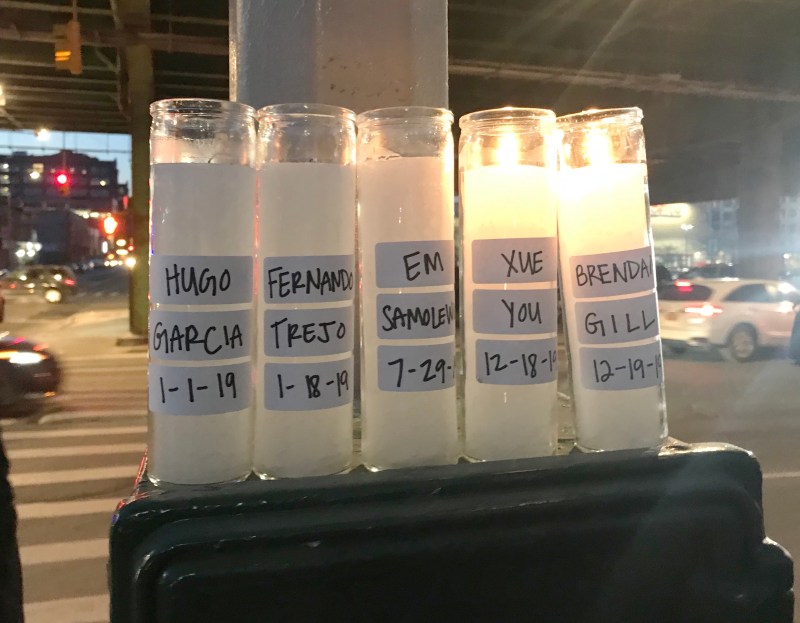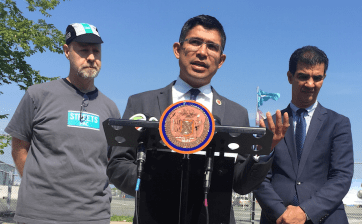Activists and Pols: We Can’t Wait Another Year to Fix Deadly Third Avenue


It was “Death on Third Avenue,” the sequel that no one wanted.
On Sunday, more than a dozen people gathered at 39th Street, just a few blocks and a few months from the last time mourners convened on Third Avenue to protest the horrific death toll on the roadway — where four people in all have been killed by drivers this year alone.
In July, activists rallied to demand changes after the death of cyclist Em Samolewicz, itself an outpouring of grief that followed the death of 26-year-old Hugo Garcia near 28th Street and Fernando Trejo, 27, near 52nd Street, both in January.
“The only thing I can think of today, honestly, is how much it’s not enough what we’re doing,” said Council Member Carlos Menchaca. “We have to ask ourselves what is it going to take — that goal is very much outlined in something the city calls Vision Zero, but we have yet to reach zero.”
The vigil itself was held near the site of the latest death, last week when a truck driver killed 85-year-old Brendan Gill near 39th Street. Gill was one of six pedestrians were killed in both Manhattan and Brooklyn in a 48-hour span last week — including another death in Sunset Park, that of pedestrian Xue You, killed as she tried to cross 52nd Street near Eighth Avenue.
From Garcia to Gill, the Department of Transportation has made only piecemeal changes to the notorious speedway, such as repainting lines.
“That wasn’t enough,” Menchaca said, standing next to his colleague, Council Member Brad Lander.

As mourners lit candles for the victims, a police officer stood on the opposite side of the street checking for speedsters. He declined to say how many truck drivers he has ticketed or what actions he’s taken. The stepped-up enforcement against truck drivers, which Mayor de Blasio announced on Friday, is helpful, but it’s merely a Band-Aid over the gaping wound that is the perilous Third Avenue, said Sunset Parker Jorge Muniz.
“Police have an important role, but what’s needed to fix Third Avenue is not more police. What we need to fix Third Avenue is money, it’s funding,” he said.
ANY loss of life is unacceptable. Beginning today the NYPD will be ramping up truck enforcement, with extra officers deployed citywide to keep our pedestrians safe.
We're investigating the recent traffic fatalities across our city and my heart goes out to the victims' families.
— Mayor Eric Adams (@NYCMayor) December 20, 2019

Funding has been allocated, but remains unspent. Rep. Nydia Velazquez said in July then that she got Congress to pay for a protected bike lane and greenway along Third Avenue in 2005. But more than a decade later, it has not been undertaken.
Community Board 7 Chairman Cesar Zuñiga echoed Velazquez’s comments on Sunday, charging that Mayor de Blasio cannot wait for yet another vigil to finally make significant changes to the dangerous roadway. In addition to the five deaths since the start of the year, there’s also been 510 total crashes, resulting in 181 injuries, including 10 cyclists and 13 pedestrians, on Third Avenue between 20th Street and 58th Street, according to Crash Mapper. That’s more than one crash per day on a very short stretch of roadway.
“A few months ago, I asked a question about how many more people have to die before we take action. And here we are again, and I’m asking the same question — how many people more people have to die before we actually take this highway that we have on Third Avenue and make it into a safe space?” said Zuñiga.
And the need to calm the dangerous speedway, which is often used as a shortcut by drivers avoiding the gridlocked Gowanus Expressway above it, is even more urgent now as private developers are expected to build the country’s largest last-mile truck distribution center in the neighborhood in 2020.
“We cannot have these conversations about development without having very serious conversations about how do we slow traffic down and how do we create more pedestrian amenities for safety,” said Zuñiga,
